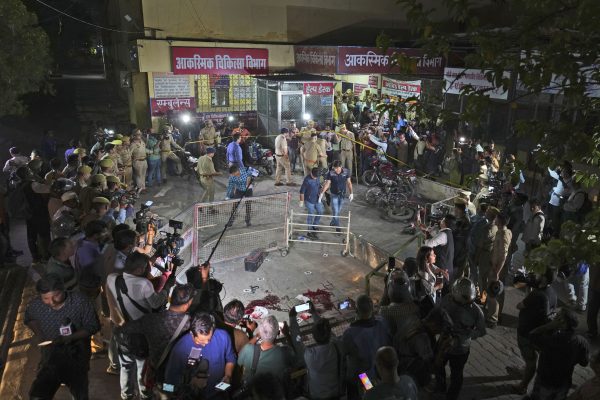
Days after Indian Prime Minister Narendra Modi hailed his country as the “mother of democracy,” a Muslim gangster under police custody was shot dead in India’s largest state, Uttar Pradesh.
The killing took place in full view of guarding police officers and television cameras even as Atiq Ahmed was taking questions from the press. As the assailants were eventually dragged away, they yelled out “Jai Shri Ram” — or “hail Lord Ram” — a religious chant often used by Hindu nationalists in India’s frequent episodes of communal violence.
To be sure, Ahmed was no angel himself. The dreaded gangster-turned-politician was serving a life sentence for a kidnapping case and faced about 100 other cases for extortion, murder and more — many filed several years ago. Yet, the outpouring of celebration that followed his killing betrayed not a culture of faith in Indian democracy, but a deep-seated skepticism over India’s institutions and its ponderously slow justice system.
Shortly after the shooting, Uttar Pradesh’s finance minister called the murder divine justice. “When crime increases beyond limits, justice is done from above,” he said. Elsewhere, workers of the ruling Bharatiya Janata Party (BJP) were reported to have burst fireworks to mark the event. Days ago, after Ahmed’s son was shot dead by Uttar Pradesh police officers in yet another case of extrajudicial killing, the state’s deputy chief minister called it “a message to criminals that this is the new India.”
Both Uttar Pradesh and the rest of India have had a history of extrajudicial violence. Incidents have grown in recent years. According to police data, since 2017, when Chief Minister Yogi Adityanath took office, over 180 people have been killed in more than 10,900 cases of extrajudicial violence in Uttar Pradesh alone. Over 800 were murdered in extrajudicial killings across India between 2016 and 2022. No one was convicted for them during that period.
That trend has run parallel with the broader exhaustion of democratic institutions. In 2021, a Pew survey found that more Indians prefer a “leader with a strong hand” than a “democratic form of government.” That inclination for authoritarianism was higher among those who had voted for the BJP in the 2019 parliamentary elections: As many as 53 percent of the BJP’s voters preferred a strongman leader; only 42 percent retained faith in democracy.
Extrajudicial violence has also been helped along by muscular Hindu nationalism and heightened communal mistrust under the BJP’s rule. Adityanath in particular has a colorful history of painting Muslims as an existential threat to Hindu voters. As far back as 2013, he declared, “Hindus must unite and remain alert wherever Muslims live and confront them if the situation so demands.”
On the campaign trail for the state assembly last year, Adityanath deftly conflated the state’s Muslim minority with its underworld menace. In one speech in Lucknow, he claimed that 20 percent of the people — a figure that approximates to the Muslim share of the population — “sympathize with mafia and terrorists.” The result has been a general willingness amongst Hindu nationalist voters to dispense with the law in prosecuting criminals — especially if they are Muslim. In such cases, the secular justice system is seen more as a hindrance than as a facilitator.
As effective as that approach may be in dealing with the underworld, it has progressively chipped away at the stability and protection afforded by the rule of law. In Uttar Pradesh, that has meant ever more draconian and heavy-handed actions from the government.
The state’s Gangsters and Anti-Social Activities (Prevention) Act, for instance, allows local authorities to seize the properties of those designated as “gangsters.” That law has been used very liberally by the Adityanath government, not just against suspected mafia dons but also against opposition voices. In 2020, the Allahabad High Court noted, “Provisions of the Gangsters Act are being misused thoroughly in the State of Uttar Pradesh by the police.”
As Hindu nationalist politics increasingly dominates India’s future, all this will have telling repercussions, not just for India’s social stability but also for its long-term economic prospects. In recent years, China’s relentless and whimsical crackdown on private sector dissidents has discouraged investors. To many of them, China’s centralized system now looks increasingly unreliable and erratic. As India metes out more justice on the streets than in the courts, its own legal environment is beginning to go China’s way.
India’s Extrajudicial Killings Chip Away at Rule of Law
Source: Frappler

0 Comments